Posts
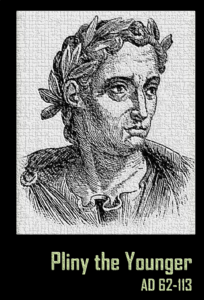 Pliny the Younger is another valuable historical source for information on Jesus and the early Church. Pliny was the governor of the Roman province of Bithynia, located in Asia Minor. In the year 112 AD, he wrote to the Emperor Trajan, asking how he should deal with those in his region who have been accused of being Christians.
Pliny the Younger is another valuable historical source for information on Jesus and the early Church. Pliny was the governor of the Roman province of Bithynia, located in Asia Minor. In the year 112 AD, he wrote to the Emperor Trajan, asking how he should deal with those in his region who have been accused of being Christians.
In the letter, Pliny describes the practices of these “criminals”:
“They were in the habit of meeting on a certain fixed day before it was light, when they sang in alternate verses a hymn to Christ, as to a god, and bound themselves by a solemn oath, not to any wicked deeds, but never to commit any fraud, theft or adultery, never to falsify their word, nor deny a trust when they should be called upon to deliver it up; after which it was their custom to separate, and then reassemble to partake of food–but food of an ordinary and innocent kind.”
From this passage, we can ascertain a number of facts about the early Church in Asia Minor:
1.Christians met on a “certain fixed day, before it was light”. This is undoubtedly a reference to Sunday worship.
2. The also “sang…a hymn to Christ, as to a God”. This worship involved worship of Jesus Christ. This is early, extrabiblical evidence of Christian belief in the Deity of Christ. In other words, the Divinity of Jesus is not a later “creation” of the Church. Who knows? Perhaps the hymn they were singing is the one St Paul quotes in Philippians 2:5-11.
3. Catholic Christianity, then as now, required adherence to the teaching of the Church on both faith (what to believe) and morality (how to live). We see the latter in Pliny’s description of the 2nd-century believers: they “bound themselves by a solemn oath, not to any wicked deeds, but never to commit any fraud, theft or adultery, never to falsify their word, nor deny a trust when they should be called upon to deliver it up”.
4. They celebrated the Eucharist. In all likelihood, that explains the reference to their “partaking of food – but food of an ordinary and innocent kind”. Why did Pliny stress that last point? It could well be a reference to the fact that Christians were thought to be cannibals, because it was said that they ate the flesh and drank the blood of a certain individual when they met for their sacred meals. Some in Pliny’s day even spread rumors that babies were sacrificed for this purpose. This is, of course, a colossal misunderstanding of the Eucharist. Early Catholics did (as we continue to do) eat the true flesh and drink the actual blood of Christ in the Eucharist, albeit in a sacramental, unbloody manner.
All of this corroborates what we know of the beliefs and practices of the Catholic Church, as presented in the New Testament.
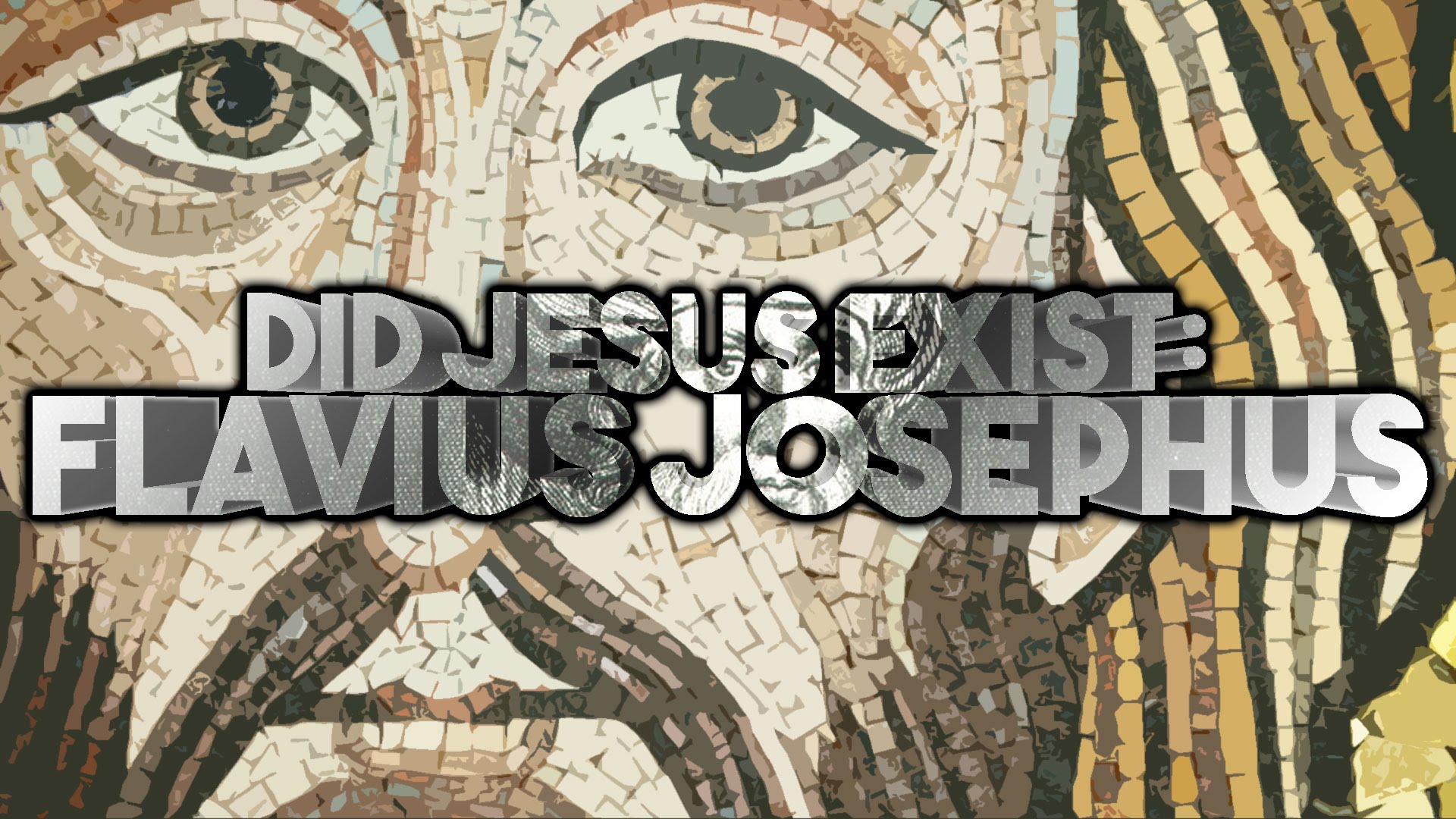
One of the greatest non-Christian historical references to Jesus was made by Josephus, the great Jewish historian. He lived in the first century (c. 37-100 AD), and was a contemporary of many members of the nascent Church.
There are two mentions of Jesus in Josephus’ great work entitled “Jewish Antiquities”. One refers to the condemnation of James, the relative of Jesus who became the Bishop of Jerusalem after Peter’s departure from the city: James was “the brother of Jesus, the so-called Christ”, according to Josephus (Ant. 20.9.1). Few question the authenticity of this passage.
Of course, there is the famous “Testimonium Flavianum” (so named because Josephus took on the Roman name of “Flavius”, being known as “Flavius Josephus):
“About this time there lived Jesus, a wise man, if indeed one ought to call him a man. For he . . . wrought surprising feats. . . . He was the Christ. When Pilate . . .condemned him to be crucified, those who had . . . come to love him did not give up their affection for him. On the third day he appeared . . . restored to life. . . . And the tribe of Christians . . . has . . . not disappeared” (Ant. 18.3.3).
Scholars believe that Josephus did write this passage, but that it was later edited by Christian interpolators, who added the phrases like “if indeed one ought to call him a man”, “He was the Christ”, and “On the third day he appeared…restored to life”. Josephus was not a believer in Jesus, and certainly would not have written those things.
However, the bulk of what he wrote can be trusted as authentic. This is made even more sure by the fact that an Arabic version of Josephus’ “Antiquities” has been discovered, where the passage in question is present, minus the interpolations.
Josephus corroborates much of what we know from the New Testament’s portrait of Jesus: that he claimed to be the Messiah, was a wise man who was thought to have performed “surprising feats” (miraculous deeds), and that his followers continued to be his disciples in a movement that continued despite his death.
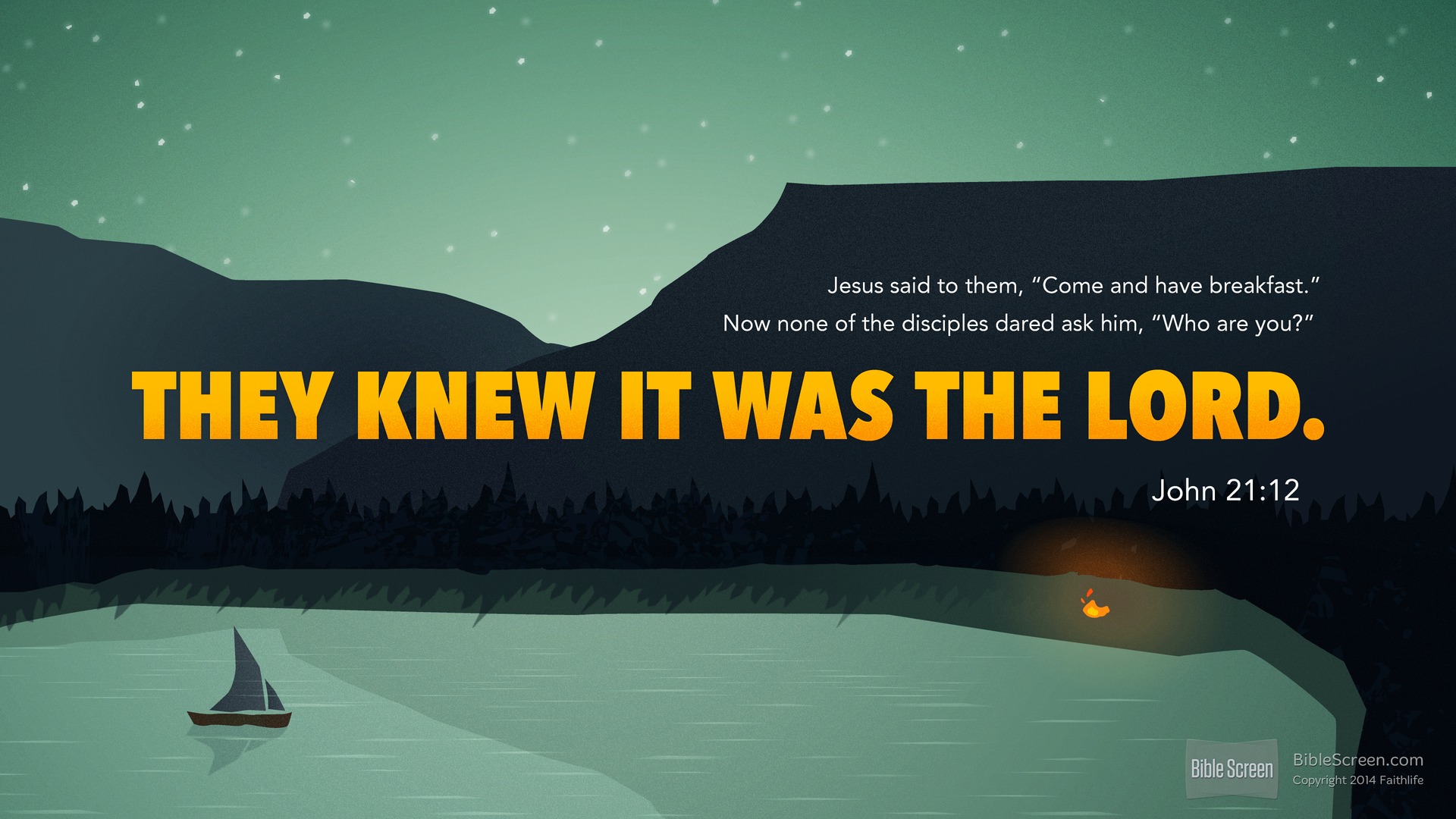
Q. This Sunday’s Gospel is taken from John 21. Does this chapter have any implications for the papacy?
A. Other texts, like Matthew 16, are often cited in this regard, but John 21 has one of the strongest proofs for the ongoing role of the office of Peter in the universal Church. Even non-Catholic scholars recognize this.
Q. Does the miraculous catch of fish in this chapter have anything to do with the Petrine office?
A. Fishing, of course, wasn’t just the former trade of the apostles; it represents their evangelistic mission of being “fishers of men”. The unbroken net conveys the unity of the one Catholic (universal) Church. Elsewhere, when Jesus provides a miraculous draught of fish, the nets begin to break from the strain; here, the nets are intact. Peter, dragging the net ashore, evokes his leadership in bringing the Church safely home to Christ, even to the shores of Heaven itself.
Interestingly, although the catch was so big that the disciples struggled to bring the nets aboard, almost sinking their boat, Peter now easily drags the net ashore all by himself. The Greek verb in the original text that is used to describe Peter’s dragging of the net is the same one used by Jesus in John 12:32. This is where Jesus says that, as he is lifted up from the earth, he will draw all people to himself.
Q. Why does the text mention specifically that 153 fish were caught?
A. By far, the most puzzling aspect of the passage is the reference to the 153 fish. First of all, this is an authentic eyewitness detail. On a secondary level, many commentators have proffered various theories to explain what this number might symbolize (John’s Gospel functions on “two levels” – there is often a secondary, “heavenly” meaning to earthly events). Most of these interpretations suggest the idea of the universality or completeness of the catch.
So, to sum up: we have Peter, alone, dragging the unbroken net of a universal catch to the shores of heaven. This is clearly a reference to his position as leader of the Church on earth.
When you add to all of this the threefold charge of Jesus to Peter (“Feed my Sheep”) that immediately follows, the picture is complete. Peter is singularly (in the original Greek text) given this responsibility to shepherd the universal Church. Keep in mind also that this event is recounted in the same Gospel in which Jesus describes himself as the “Good Shepherd” (John 10). Before his Ascension, Jesus here reaffirms Peter’s unique leadership position, passing the earthly reins of the Church to him.
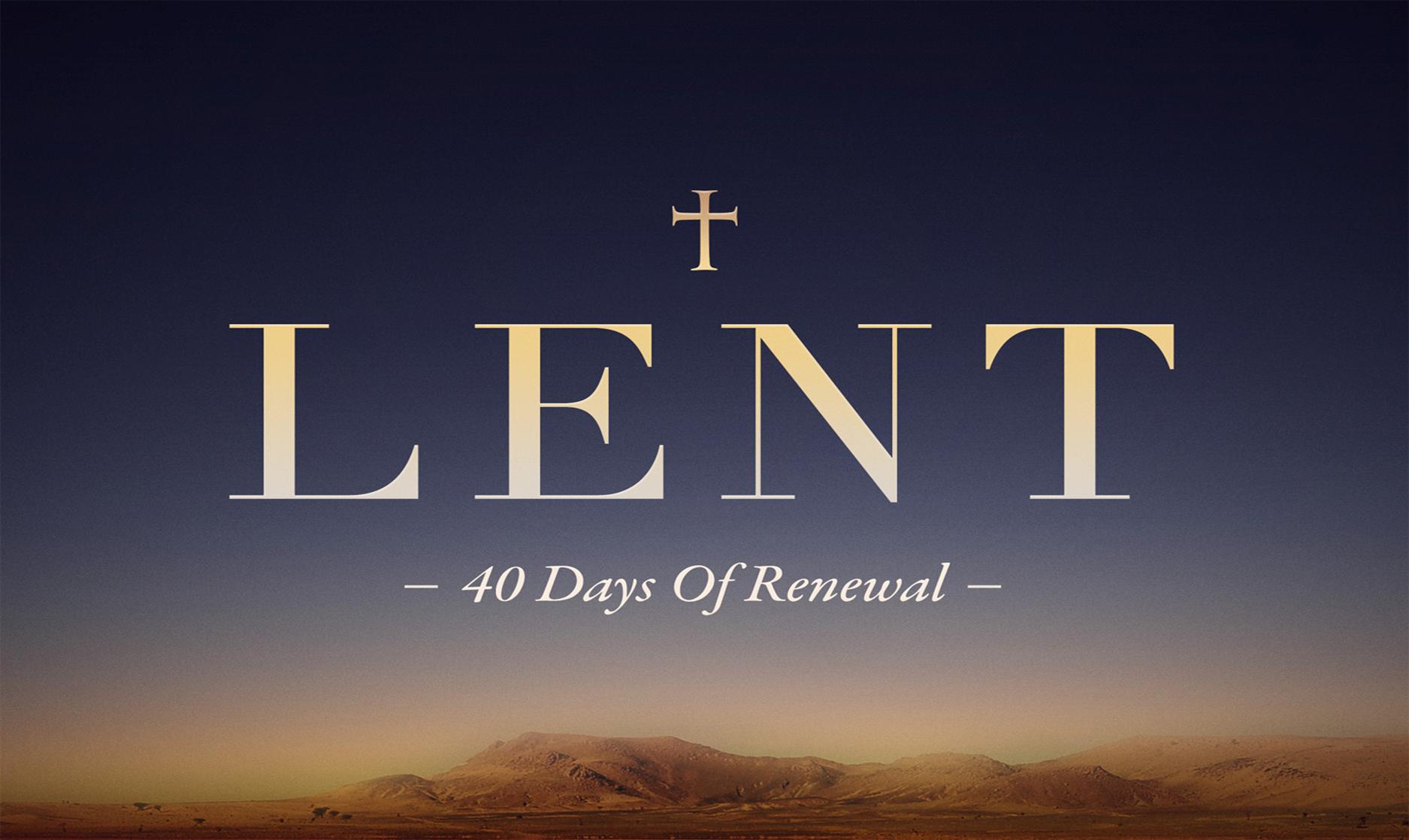
Q. Today’s readings have a common theme: the absolute need to repent of sin, but also God’s abundant mercy for those who do. Would you agree?
A. That’s true. Psalm 103, the Responsorial Psalm from today’s readings, reminds us that “The Lord is kind and merciful”. One of the greatest mercies God provides for us is to “tell it like it is” – to explain reality to us, and warn us of the consequences of not repenting.
This is why St. Paul, in the second reading from 1 Corinthians 10, speaks about members of the Old Testament people of God who did not make it from Egypt to the promised land of Israel. Tragically, these people were “struck down” in the desert because they were not pleasing to the Lord. This was despite the fact that “all of them were baptized into Moses in the cloud and in the sea. All ate the same spiritual food, and all drank the same spiritual drink, for they drank from a spiritual rock that followed them, and the rock was the Christ.”
Q. How does this apply to Catholics today?
A. The same dangers and consequences of unrepentance face the modern-day people of God. Like the Israelites of the Exodus generation, Catholics can sometimes view their baptism as a sort of “lifetime membership card” for Heaven. They frequent the communion lines, but not the queue for the confessional. They “all eat the same spiritual food, and all drink the same spiritual drink – the Christ” in the Eucharist. But they run the same risk that the Israelites did – of being “struck down” in the journey through the wilderness of this life, and not making it to the true promised land of Heaven. The reason is that they feel no need to repent of their sin. Just being “Catholic in name only”, they feel, will be enough to get them “in”. But God is not mocked.
Q. How can we avoid this trap?
A. By sincere repentance, and producing the fruit of the Kingdom in their lives. God will always forgive the one who truly is sorry for their sin, and who desires to change. This is why Jesus reminds us that “God is no respecter of persons”. This means that he judges everyone by the same, objective standard. As Jesus said in today’s Gospel, speaking of people who had died tragically in his time, “unless you repent, you will all perish as they did”.
Jesus then tells a parable about a fruitless fig tree. The owner wants to cut it down, but the “gardener”, who represents Christ, pleads with him to give him more time to “fertilize” it. After one more year, if the tree is still fruitless, the owner can cut it down.
We are like those trees. Christ has given us all the “fertilizer” we need to grow and bear fruit that will last. The scriptures, the sacraments, the teaching of the Church, the community of faith – all the conditions necessary for growth. We never know how much time we have left before we face eternity. Let us not waste this Lent. Who knows? It may be the last one we ever have. Let us truly repent and produce the fruit of the Kingdom in our lives, that we may share in the joy of the resurrection harvest.

“Faith is not only knowledge committed to memory, but truth lived in love” – Pope Francis
The saints are all total Christians. That is, they practice both the corporal and spiritual works of mercy. This is what all Christians are called to do, as we strive to live up to our baptismal call to be saints. And this is a theme that Pope Francis has been hammering away at during this Jubilee Year of Mercy.
It was no different today, as he spoke to the Congregation for the Doctrine of the Faith (or CDF). This is, of course, the office in the Vatican that’s responsible for maintaining doctrinal integrity within the Church. The great Cardinal Joseph Ratzinger was for many years the head of the CDF before his election as Pope Benedict XVI.
Many Christians tend to emphasize either the corporal (looking after people’s bodily needs, such as feeding the hungry, etc.) or spiritual (instructing the ignorant about the Faith, etc.) works of mercy, while often utterly neglecting the other group of works. But the truth is, we can’t neglect either set. Just as the human person was created as a body-soul unity, we must look after people’s bodies and souls. We must be willing to feed people physical and spiritual food (in the Eucharist, we have both). We must have, as Peter Kreeft says, “liberal hearts and conservative heads”. We must hurt for the physically suffering, and also for those who are thirsty for the Truth.
The Pope knows this – hence, his speech today. Here are some of the most relevant snippets below (I’ve highlighted some of what I feel are the most important aspects in bold):
Vatican City, 29 January 2016 (VIS) – “Mercy is the foundation of the life of the Church: the first truth of the Church, indeed, is Christ’s love”, were the opening words of the Holy Father’s discourse to the participants in the plenary assembly of the Congregation for the Doctrine of the Faith, whom he received in audience this morning in the Clementine Hall. The Pope went on to urge all the Christian people, both pastors and the faithful, to rediscover during this Jubilee the corporal and spiritual works of mercy as when, in the twilight of life, we are asked if we have given food to the hungry and given the thirsty water to drink, we will also be asked “if we have helped people to set their doubts aside, if we have committed ourselves to welcoming sinners, admonishing them and correcting them, if we have been able to combat ignorance, especially in relation to the Christian faith and the righteous life”.
“In faith and in charity a cognitive and unifying relationship is established with the mystery of Love, which is God Himself. The effective mercy of God became, in Jesus, affective mercy, as He made Himself man for the salvation of mankind. The task entrusted to your Dicastery here finds its ultimate foundation and and adequate justification. Christian faith, indeed, is not only knowledge to be committed to memory, but also truth to live in love. Therefore, along with the doctrine of the faith, it is also necessary to safeguard the integrity of customs, particularly in the most delicate areas of life. Adhering to faith in the person of Christ implies both an act of reason and a moral response to His gift.”
Do you agree with Pope Francis’ statements here? Share this post and your answers on Facebook, Twitter, or LinkedIn!

Q. At this time of year, people are trying to fulfill all of their New Year’s resolutions. Should Catholics make any special resolutions of their own?
A. Yes, we as Catholics should indeed make some specific resolutions. But, before we talk about that, we need to look at a much bigger problem. According to the latest research, only 8% of New Year’s resolutions are kept. That’s a staggering 92% failure rate! Many people make resolutions to do with bettering their health, their financial lives (say, getting out of debt), or improving a relationship in their lives.
The problem lies with the fact that these “resolutions” are usually far too vague – and that is one reason they fail. For example, “I resolve to lose weight this year”. You can almost guarantee that won’t happen.
Q. So, what do you propose, then?
A. It’s better to speak not of resolutions, but goals. And they need to be specific. For example, “I will lose 10 pounds by March 31”. That is specific goal, with a deadline attached to it. Now, you simply need to figure out the action steps needed to get there.
Q. I see. Obviously, we need to apply the same mind-set to our spiritual lives, right?
A. Exactly. People make goals for all kinds of relationships in their lives – with others, and with themselves. But the most important relationship we have in our lives is with God. And we can’t simply “drift” and leave this relationship to chance. What is our game plan? How are we going to take the next step in our relationship with Christ? How are we going to become saints, as he has called us to do?
Q. What are some specific goals Catholics can aim for?
A. Well, it’s tough to make general comments on this, because each person is at a different stage in their relationship with Christ. But there are some specific goals that would benefit everyone. Here are “seven habits” (to borrow a phrase from Stephen Covey) which we can all, with a little effort, inculcate into our lives:
- Making a morning offering, dedicating one’s day to God, and doing a brief (2 minutes) examination of conscience at night (asking, “What have I done well? What didn’t I do well? What can I do better tomorrow, with God’s help?”).
- Daily prayer. Beginners should start with 5 minutes in the AM, and 5 minutes in the PM, eventually working towards 15 minutes for each session (with the ultimate goal of 30 minutes for each).
- Attending at least one daily Mass outside of our Sunday obligation. It is amazing what a difference this makes in one’s spiritual life.
- Reading the New Testament for 5 minutes a day.
- Reading another spiritual book for 10 minutes a day (this can be done on the train, or whenever one can fit it into one’s schedule). Many saints have been made through reading!
- Praying the rosary and the Angelus daily.
- Going to confession at least once/month (with the ultimate goal of going weekly).
As with any relationship, it takes some time and effort. We won’t always execute the plan perfectly, but, if we truly want to improve our relationship with Jesus Christ, we will.
How are your own spiritual goals coming along so far this year? Share this post and your experiences on Facebook, Twitter, Pinterest, or LinkedIn!
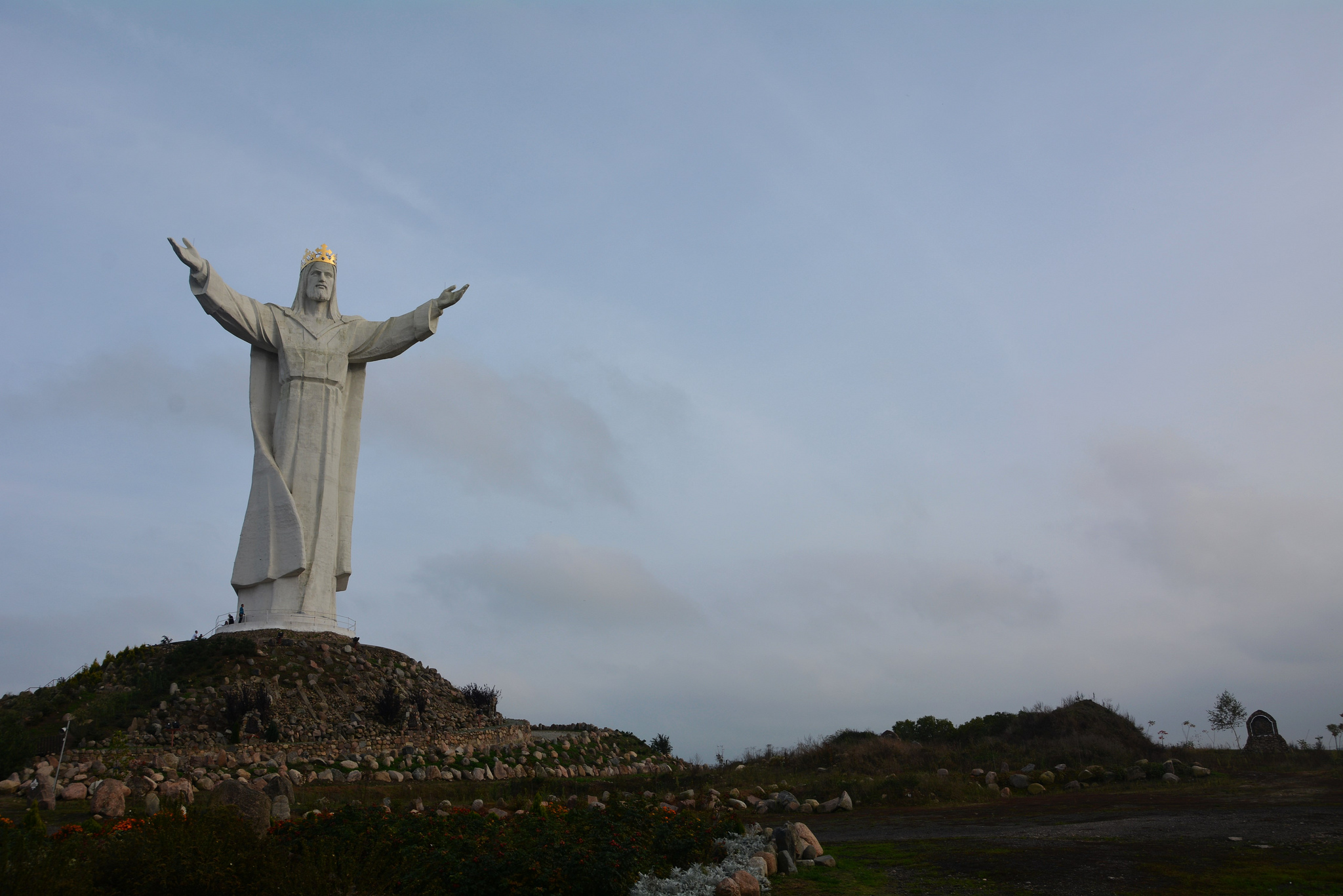
Q. This Sunday is the Feast of Christ the King. Can you explain how this relates to the second reading, which is taken from the Book of Revelation?
A. In the Old Testament, the Kings of Israel (think of David and Solomon) and the priests of Israel (think of someone like Caiaphas, the High Priest who condemned Jesus to death, along with Pilate), were different individuals with different roles. In fact, the Essenes (the Jewish sect that lived, among other places, at Qumran and wrote the Dead Sea Scrolls) expected two different Messiahs to come: a Priestly Messiah, and a Kingly Messiah. They actually expected the Kingly Messiah to wage war against Rome, and that he would personally slay “The King of the Kittim” (the Roman Emperor himself) in the final battle.
Jesus radically combines (and redefines) the roles of King and Priest in his own person. In fact, Jesus is both Priest and Victim, the sacrifice and the one who offers it: “Jesus Christ is the faithful witness” (Revelation 1:5). The word “witness” in the original Greek text means “martyr” – one who offers one’s life for God. Unlike the Kingly Messiah envisioned in the Dead Sea Scrolls, Jesus does not attempt to kill the Roman official, Pilate, but instead allows himself to be killed as a sacrifice for sin. This is why Jesus says to Pilate (as we read in today’s Gospel): “My kingdom does not belong to this world. If my kingdom did belong to this world, my attendants would be fighting
to keep me from being handed over to the Jews” (John 18:36).
Jesus is indeed King – not just over Israel, but over all nations: “the ruler of the kings of the earth” (Revelation 1:5). Jesus received this kingship from God the Father, which is why Revelation says that “he is coming amid the clouds” (Revelation 1:7). This is actually a reference to today’s first reading from the Old Testament Book of Daniel (Daniel 7:13-14), which speaks of “one like a son of man” (remember, “Son of Man” was Jesus’ favourite self-designation on the Gospels), “coming with the clouds of heaven” to receive “dominion, glory, and kingship” from “the Ancient of Days” (God the Father). The Daniel text says that “all peoples, nations, and languages serve him”. This will indeed be fulfilled at Jesus’ Second Advent.
Q. How can we apply these truths to our lives today?
A. Today’s second reading reminds us that Jesus “has made us into a kingdom, priests for his God and Father” (Revelation 1:6). By virtue of our baptism, we all share in Christ’s “offices” of King and Priest. And we must exercise these offices the way Jesus did: we don’t “Lord it over people”, but rather lay down our lives for others by serving them as Jesus did. Everything we do – in our spiritual life, our work, our relationships, and in sharing our faith – must be united by this concept of serving God and others. This is our priestly sacrifice for God. And in Jesus’ Kingdom, “to serve is to reign.”

As we continue through this month of November, we’re getting closer and closer to the end of the liturgical year. This month has also seen us celebrate the feasts of All Saints and All Souls. So, it is a natural thing to think about our final end as we approach the end of another Church year. It’s also, of course, profitable to “begin with the end in mind”, to consider how our supernatural destiny following death affects our purpose in daily life.
Here are four thought-provoking verses from the New Testament that shed light on this:
1) “You, therefore, must be perfect, as your heavenly Father is perfect” (Matthew 5:48).
In these words from the Sermon on the Mount, Jesus is preaching to the vast crowds. He is not speaking only to his “priests” (the Apostles). In other words, the Lord expects all baptized believers to be saints – not just priests, nuns, and monks. This is the “universal call to holiness”, which Vatican II reminded us of. It is both as old and as new as the Gospel.
2) “This is the will of God, your sanctification” (1 Thessalonians 4:3).
Many people wander through life wondering what God’s will for them might be. Saint Paul spells it out to the Thessalonians: God’s will is that you become a saint. His will is that you be holy, that you be sanctified. And what does it mean to become a saint? Nothing more than becoming the best version of yourself, the masterpiece God had in mind when he created you. In the verses that follow, St Paul also spells out some obvious facets of the life of sanctity, including avoiding immorality.
3) “He (God the Father) chose us in him (Christ) before the foundation of the world, that we should be holy and blameless before him” (Ephesians 1:4).
Saint Paul writes here to the Ephesian Church, reminding them of God’s plan for them from all eternity: that they would be saints. Paul was writing to a group that included many ordinary, everyday Christians: blacksmiths, metalworkers, and others involved in the trades. God expected the same sanctity from them as he did from Paul. The same is also true, of course, for you and I.
4) “Without holiness, no one will see the Lord” (Hebrews 12:14).
All of us want to go to heaven after we die. All of us want to see Jesus face-to-face. The writer of Hebrews gives us some straight talk: only saints get into heaven. So, if you want to go there, get serious about your spiritual life. Satan likes to trick us with the lie that there are three different kinds of people: those who are obviously saints, those who are obviously evil, and regular people like you and me. But we read in the parables of Jesus in the Gospels about many “normal, good people” who didn’t make it to heaven, because they failed to take God seriously: the “foolish virgins”, for example (Matthew 25:1-13), or those who refused the invitation to the wedding feast because they were too “busy” (Luke 14:15-24). If your goal is to get into heaven “by the skin of your teeth”, what happens if you miss your target? Rather, we should make up our minds to become saints. We can, with God’s help.
Are there other biblical verses that you have found helpful in responding to the call to holiness? Share this post and your answer on Twitter, Facebook, or LinkedIn.
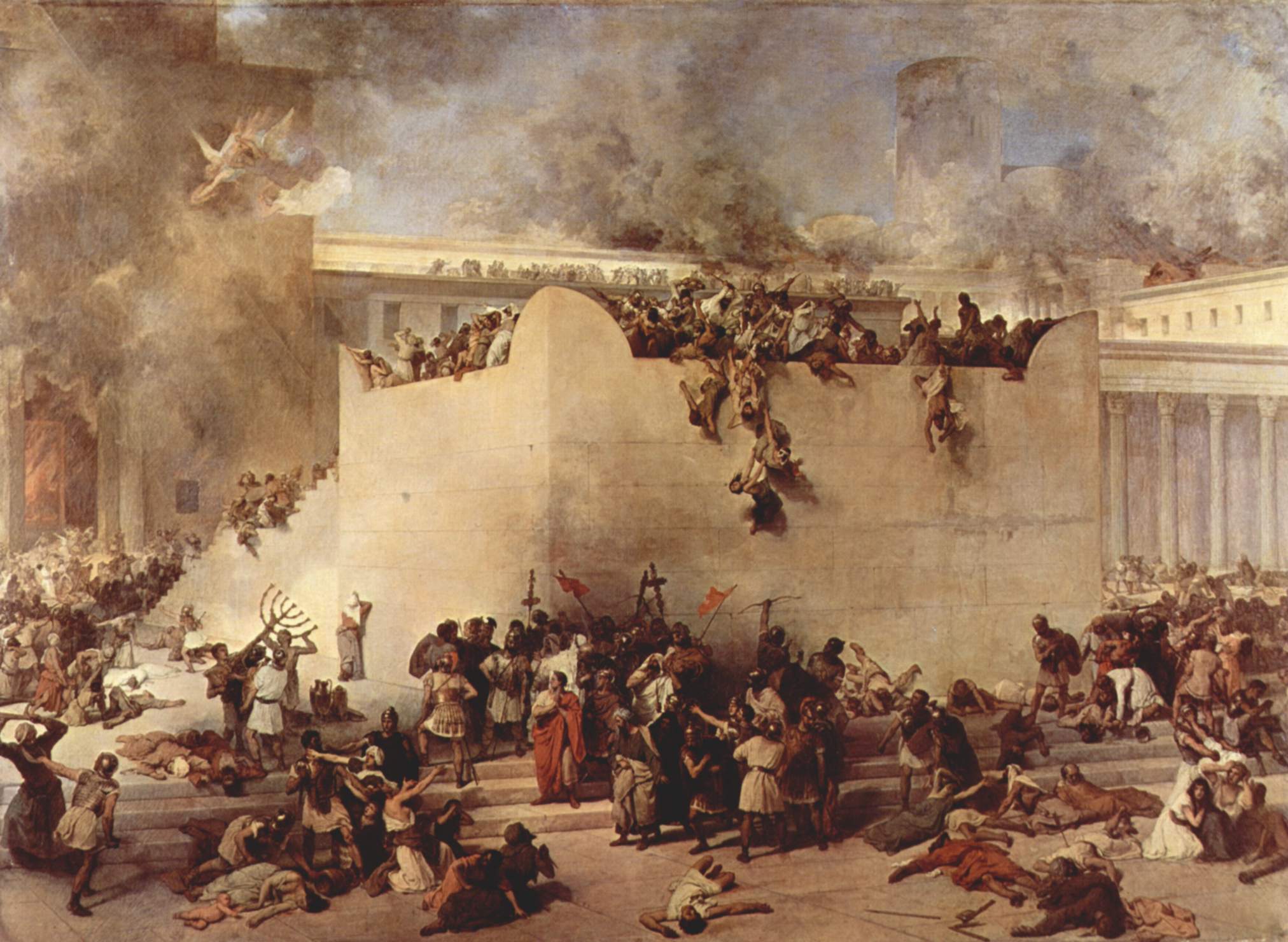
Q: In this Sunday’s Gospel, Jesus appears to be talking about the end of the world. Is he?
A: There is a real connection with what Jesus is saying here in Mark 13, and with the Book of Revelation, which we are studying on Thursdays here at St Justin’s – you’re welcome to join us! Jesus’ “eschatological discourse” on the end of the universe indeed has reference to the end of history, and the renewal of the space-time universe in which we live. But its most immediate meaning refers to the destruction of Jerusalem and its temple in the year 70 AD.
Remember, Jesus says “Amen, I say to you, this generation will not pass away
until all these things have taken place.” How long is a generation? 40 years. Let’s do some quick math: Jesus’ death and Resurrection took place in approximately 30 AD. Jerusalem and its temple were destroyed exactly 40 years later, in 70 AD. So, Jesus’ solemn prophecy came true. Should anyone be surprised?
Q: What does the destruction of Jerusalem’s temple have to do with the end of the universe?
A: To the Jews, the temple was a miniature model of the universe, and the universe was to them, as it were, a gigantic temple. The temple curtain separating the Holy Place from the Most Holy Place had images of the stars, the moon, and the planets. Thus, when it fell, it was like Jesus predicted: “the moon will not give its light, and the stars will be falling from the sky”.
God’s judgment fell on the wicked temple establishment in 70 AD because of its rejection of the Messiah, as well as because of its avaricious, self-serving leadership. This was indeed the point of last Sunday’s Gospel reading from Mark 12 (the widow’s offering). Almost every preacher uses that text as an example of trust in God and sacrificial giving on the poor widow’s part – and that is undoubtedly a good application of the text.
But, read in context, it is a living parable of what Jesus had just explained about the religious leaders of his day. Jesus had said: “Beware of the scribes, who like to go about in long robes, and to have salutations in the market places and the best seats in the synagogues and the places of honor at feasts, who devour widows’ houses and for a pretense make long prayers. They will receive the greater condemnation.” And he sat down opposite the treasury, and watched the multitude putting money into the treasury. Many rich people put in large sums. And a poor widow came, and put in two copper coins, which make a penny. And he called his disciples to him, and said to them, “Truly, I say to you, this poor widow has put in more than all those who are contributing to the treasury. For they all contributed out of their abundance; but she out of her poverty has put in everything she had, her whole living.” (Mark 12:38-44).
The religious leaders of Jerusalem were supposed to be caring for widows and orphans. Instead, they were “devouring widows’ houses”. And here we have a widow whose house is indeed “devoured”. The two small copper coins she had put into the offering represented, in a sense, her last meal – they were just enough money to buy flour to make one small loaf or cake. In a sense, this woman’s plight was a living illustration of what Jesus had been complaining about.
The ill-treatment of those who were to be cared for and the rejection of Jesus as Messiah were characteristic of an evil temple leadership whose hearts had been closed to God and others. This is why Jesus wept over the city of Jerusalem: he foresaw its destruction because many would fail to repent. May our own hearts learn the lesson well.

